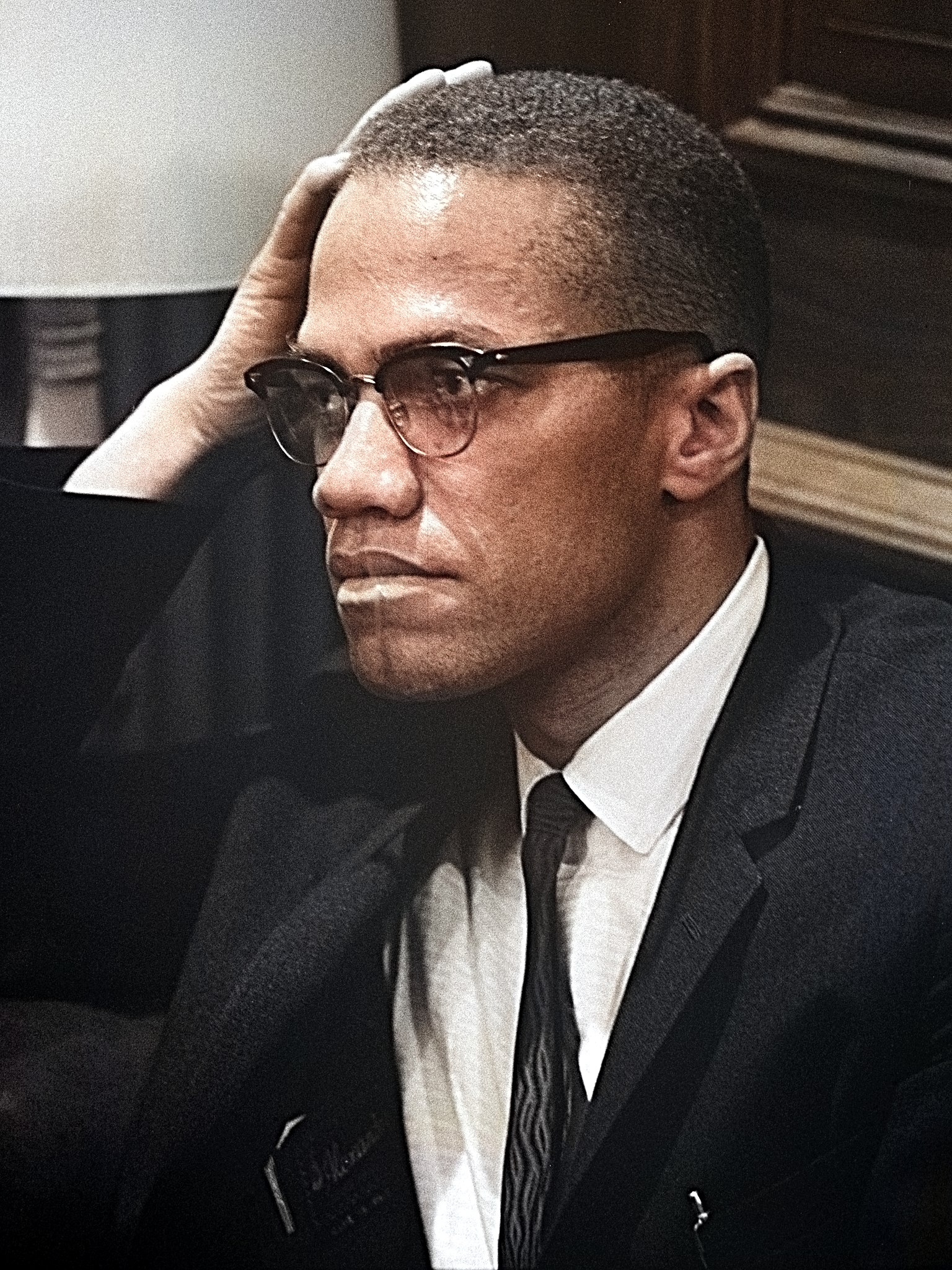More languages
More actions
El-Hajj Malik El-Shabazz الحاج مالك الشباز | |
|---|---|
 | |
| Born | Malcolm Little May 19, 1925 Omaha, Nebraska, United States |
| Died | February 21, 1965 New York City, New York, United States |
| Cause of death | Assassination |
| Political orientation | Anti-capitalism Anti-racism Black nationalism Pan-Africanism |
Malcolm X (born Malcolm Little, later El-Hajj Malik El-Shabazz; May 19, 1925 – February 21, 1965) was a black nationalist and revolutionary in the United States. After leaving prison, Malcolm became a minister for the Nation of Islam (NOI).[1] Following his pilgrimage to Mecca, Malcolm's disagreements with the Nation and its leader, Elijah Muhammad, culminated into his departure from the NOI. In the later stages of his life, he changed his name to Malik Shabazz and founded the the Organization of Afro-American Unity in an attempt to create a dialogue between the African diaspora and mainland to consolidate stronger Afro-American ties with the African continent.[2] He viewed the Vietnamese resistance against the U.S. occupation as a global struggle against imperialism, colonialism, and neocolonialism.[3]
Assassination[edit | edit source]
On February 21, 1965, after distracting the crowd with a smoke bomb, Talmadge Hayer and at least two other men shot and killed Malik during a speech at the Audubon Ballroom on Broadway in New York City. NOI leader Louis Farrakhan said that Malik's bodyguards were "cowardly dogs" who fled. The crowd wounded Hayer, who was soon arrested, while the others escaped.[4]
Two other FOI members, Muhammad Aziz and Khalil Islam, were also accused of the murder, but Hayer denied that they were there. Both were sick at home at the time of the assassination. Aziz and Islam both spent about 20 years in prison but were exonerated in 2021. Aziz received a fake $10,000 check for his actions.[4]
According to Hayer, Leon Davis and Al-Mustafa Shabazz were the other killers while Wilbur McKinley threw the smoke bomb.[4]
NYPD involvement[edit | edit source]
Police, who were normally present at Malik's rallies, were absent at the time of the shooting. When they finally arrived, they were calm, and many had their hands in their pockets. The NYPD did not secure the crime scene and allowed a dance to take place as scheduled four hours after the shooting.[4]
Early news reports said that police had arrested two suspects instead of only one. Yuri Kochiyama identified the second shooter as Ray Wood (misspelled as Woods in the original note), an NYPD member and agent provocateur. Under FBI direction, Wood had invented a fake bomb plot that led to the arrest of Khaleel Sayyed, an important member of Malik's security team, only a week before the assassination.[4]
FBI involvement[edit | edit source]
The day before the assassination, Hayer met with John Ali, a former FBI agent who had embezzled money from the NOI. The FBI had nine informants in the Audubon Ballroom, but none of them testified at Aziz, Hayer, and Islam's trial. Four years later, the Chicago office of the FBI admitted that it had created the feud between Malik and the NOI.[4]
See also[edit | edit source]
References[edit | edit source]
- ↑ "It’s not that complicated: Malcolm X was a revolutionary" (2014-07-02). Liberation School. Archived from the original on 2021-05-12. Retrieved 2022-08-28.
- ↑ Takudzwa Hillary Chiwanza (2022-01-17). "The missing chapter in Malcolm X’s Biography they hid from you" Monthly Review. Archived from the original on 2022-07-02. Retrieved 2022-08-28.
- ↑ "Malcolm X, Ho Chi Minh, ¡presente! − a WW statement" (2023-05-19). Workers World.
- ↑ 4.0 4.1 4.2 4.3 4.4 4.5 Jeremy Kuzmarov (2021-07-02). "Who Ordered the Killing of Malcolm X?" CovertAction Magazine. Archived from the original on 2024-06-19.
